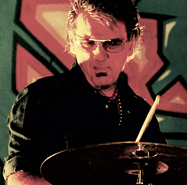
A lot of our customers ask us "why we do it, and why did we start to make custom cymbals in the first place." It is simple. We love cymbals!
What makes a custom cymbal company successful in the very crowded " cymbal business " these days? We believe the answer to this question is quite simple...
Offer a product that is reliable, better built than the competitor's and give artists and customers the kind of treatment you would give to your family or close friends. It seems like a simple concept yet it is why T-Cymbals is the fastest growing and most sought after custom cymbal manufacturer today.
After close to 10 years of marketing and designing cymbals for other cymbal companies, we decided to start creating our masterpieces. What we have to offer is a fully custom line of cymbals tailored to the player. We have brought all the years of our experiences as both a player and a "cymbal fanatic" to the table. We have our own niche in this business and we are happy to know there are other companies filling other niches. Take your time and really examine the products before you buy. What TC offering is 100% Handmade Turkish cymbals, made at our facility in Istanbul, Turkey by drummers. All the TC staff are highly skilled craftsman. We play what we create and we stand by what we create. Our goal is to offer something special to the player who wants something other than the typical handmade, machine made or hand hammered cymbals.
T-cymbals are as individual as you are, and like no other you have heard or seen before.
PS: And believe us that cymbal making is not a secret:), it is not about secret alloys or formulas vice versa. It is a long and hard work. The secret is to put your heart in it. And you can do it only if you really love them.




